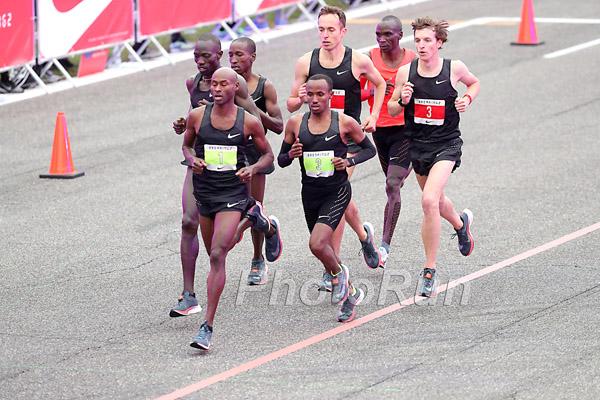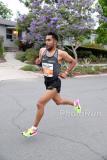Folders |
Chris Derrick Discusses His Evolution As a Marathoner Going Into New YorkPublished by
Marathon Lessons A Conversation With Chris Derrick, Who Is Still Learning As He Goes To New York Story by Dave Devine of Dyestat Just over 12 months ago, when Nike pro Chris Derrick toed the line at the 2017 Chicago Marathon, he harbored relatively modest goals for his debut at the distance. “Going into Chicago last year,” he recalled recently, “my goal was essentially to not completely blow up.” Derrick had heard his share of stories about nascent marathoners “getting hyped up for that first marathon, crushing workouts, and then really going for it,” only to finish well shy of pre-race expectations. A string of ill-timed injuries, and his own experience with disappointing outcomes, found the three-time national cross country champ hedging his hopes for the initial foray over 26.2 miles. “I just wanted something that proved I was Okay,” he said. “Show myself that I could make it through the race and run respectably. And I think I was able to do that.” Ninth overall, and the second American behind winner Galen Rupp, Derrick’s 2:12.50 opener offered the reassurance he was seeking, even if he suffered, in the closing miles, some of the harsh instruction the marathon can impart. “The last five miles,” he admitted, “were a progressive death march.” This Sunday, Derrick will again tackle the distance — this time at the TCS New York City Marathon — with slightly higher ambitions. Reached by phone at an altitude training camp in Mammoth Lakes, Calif., Derrick allowed that a return to Chicago was certainly on the table before he and his Bowerman Track Club coach, Jerry Schumacher, settled on the Big Apple for Fall 2018. “I definitely considered going back to Chicago,” he said. “Both races are excellent. The only problem with either race is the opportunity cost of not being able to do the other one.” Discussions with Schumacher balanced questions of where Derrick might be most successful with where he might stand to learn the most as he narrows his focus toward an expected run at the 2020 Olympic Trials. Both conceded that he’ll realistically have — at most — three marathon attempts in the bank before the Trials: Chicago 2017, New York City 2018, and perhaps one more in the spring of 2019. “That won’t be a ton of experience,” Derrick said, “so I want to make sure that each one has some sort of learning experience or some sort of valuable thing to learn, so I can feel prepared, tactically and mentally, for the Trials.”
Volume and Consistency
They sent him to cross country camp. There, Derrick encountered Neuqua Valley head coach Paul Vandersteen, a mentor who preached the benefits of consistency within a program of gradually increased mileage. When the reedy freshman managed a 5:16 one-mile time trial the following spring, Vandersteen sold him on the unlikely idea that he could make the varsity seven the next autumn. Derrick, as a sophomore, ended up the top runner on the team. More than a decade later, he’s somewhat amused that the boy who couldn’t break 5:10 for one mile in ninth grade averaged faster than that for 26 miles in his marathon debut. Perhaps unsurprisingly, the coach who helped Derrick make the successful leap to the marathon shares many attributes with that first coach back in high school. Schumacher also ascribes to a philosophy of nose-to-the-grindstone consistency and increased volume over time. “What he wants the sport to be,” Derrick said, “is that if you are willing to work incredibly hard, and deal with shit, then you’ll be successful. He doesn’t want anyone to believe it’s going to be easy.” Derrick acknowledges that all the mileage — the act of “showing up” each day — can veer towards the redundant, but a growing affinity for the simple act of running, engendered in part by stretches when he’s been unable to, has broadened his appreciation for the gift of lacing up and heading out each day. “It can be a bit boring at times,” he said, “but I like running more than I did when I was younger because I’ve now had experiences of not being able to do it, so I appreciate days of just ‘regular runs’ that feel good. Being able to put in the necessary work without any restrictions is something I appreciate more than I did when I was 20.” Derrick also reflected on the inherent dangers of ambition in the aftermath of a breakthrough, pointing out that modest success in Chicago didn’t necessarily mean ramping up even harder in preparation for New York. “There’s a fine balance to maintain between being ambitious and actually doing what’s necessary to achieve those ambitions. It’s not always what you think it’s going to be.” In the spring of 2017 he was still focused on track races, which meant lower overall mileage in the run-up to Chicago. This past spring, Derrick was able to accumulate significantly more mileage, including his best six-week period ever after winning the USATF Half Marathon championship in early May. But that ambitious build-up also resulted in tired legs for a pair of benchmark summer races: the Boston Athletic Association 10K (sixth place) in June, and Atlanta’s Peachtree Road Race (10th place) in July. “I was probably slightly overcooked,” he said, “which is — well, I’m still learning about becoming a marathoner.”
A Scary Setback If spent legs blunted his efforts in Boston and Atlanta, it was another disruption altogether that kept him from a third planned 10K — Maine’s Beach to Beacon — in early August. In mid-July, Derrick suffered a bike crash that sidelined him for more than a week. Cycling alone near Portland’s popular Springwater Corridor path, his front tire hit a seam in the pavement where cement turned to asphalt, sending him tumbling. “I hit my head pretty hard,” he said. “I was wearing a helmet, but I cracked my helmet.” Found by passersby and shuttled by ambulance to a nearby hospital, Derrick has no recollection of anything from before the crash until after midnight that evening. “I guess I was unconscious for a period, but it’s more like I just don’t remember.” After a CT scan to check for vertebrae damage, the medical team concluded he’d suffered a concussion, but had no additional injuries beyond “road rash” and neck soreness. The concussion protocol mandated more than a week off from running. When he started training again, he had 16 weeks until New York. “It was not…the worst time, if I was going to do that to myself.” After that July setback, the build-up to New York has been similar to Chicago, but with greater consistency and fewer interruptions. Two months before Chicago, Derrick hit an injury snag and only managed 35 miles on the week, then nursed a sore hamstring the remainder of the way. “So just getting rid of that,” he said, “avoiding any big layoffs in the build-up, and maintaining better consistency across the whole thing, that will hopefully lead to a better result in New York.” Inspiration, from Monza to Mammoth Lakes Even if New York delivers the lessons he and Schumacher are hoping, Derrick knows he’ll still be a relative neophyte when the Trials arrive in February 2020. That limited window has meant narrowing his focus to a few key efforts and developing a capacity to absorb the teachings of every race. It’s something Derrick witnessed firsthand from an athlete many consider the best ever. “Eliud Kipchoge would be the best and greatest example of that,’ Derrick said. “He runs two races a year, and they’re both major marathons, and that’s it — he focuses all of his energy on that thing.” In May 2017, when Derrick joined a cadre of pacers recruited by Nike to shepherd three top marathoners for the much-anticipated Breaking2 project in Monza, Italy, he was admittedly dubious that any of the assembled trio — Lelisa Desisa, Kipchoge or Zersenay Tadese — could approach the 2-hour mark. And then he spent a week with Kipchoge. “I went in pretty skeptical of anyone being able to get close to it,” Derrick said, “and then you kind of hang around, and he definitely exuded confidence that made me believe it was possible.” Reaching for a metaphor to explain the sense of calm and zen-like confidence he observed in Kipchoge, Derrick — who said he typically pokes fun at motivational quotes — produced a familiar pop culture reference. “There’s that scene in The Empire Strikes Back, when Luke (Skywalker) is trying to lift the X-Wing out of the swamp, and he says he’ll try, and Yoda says, ‘Do. Or do not. There is no try.’ “That’s almost the demeanor that I found in (Kipchoge). He’s going to set his mind to the task, and he’s going to do it. And he’s not going to go into the race thinking, ‘Well, I’ll find out in 10 minutes if I can do it or not.’” As the Breaking2 effort unfurled around the Monza Formula One race track, and as Derrick and his fellow pacers traded lead duties until Kipchoge alone remained in their slipstream, he was struck again by the Kenyan’s assured demeanor. “He didn’t waste any time worrying about whether it was going to work out or not. He just went for it.” Derrick was quick to clarify that he didn’t have lengthy conversations with Kipchoge in Italy — “It’s not like he told me, ‘This is the secret of marathoning…’ or anything like that.” — but that simply observing how the marathon great carried himself made a deep impression. And it wasn’t just Kipchoge’s preternatural composure that struck Derrick. On the eve of the Breaking2 effort, the assembled Nike contingent was gathered to watch the Doha Diamond League meet, when a woman from Kipchoge’s training group, Hyvin Kiyeng, won the 3,000-meter steeplechase. Kipchoge, Derrick recalled, “was jumping up and down, cheering her on and hugging his teammates at dinner, and that resonated with me, as someone who cares about a team environment and the importance of a team — to see that he was really invested in his whole group.” It’s the kind of camaraderie and commitment Derrick has found in his own Portland-based club. He remembers reeling after a daunting 10,000-meter final at the 2016 Olympic Trials, and receiving timely encouragement from two Bowerman teammates who would eventually serve as marathon mentors. “I was not in very good shape; I was hurt, kind of a disaster going in,” Derrick recalled. “It was a hot day, but I battled as hard as I could, I got fifth, and I wasn’t close to making the team. And I remember being exhausted, extremely sweaty, and leaving the media mixed zone and Amy (Cragg) and Shalane (Flanagan) were there. They’d waited for me, 15 or 20 minutes, just to let me know they were proud of me. They wanted me to know that it was going to happen for me someday, and that meant a lot to me. “They’re two people I really admire for their toughness and their perseverance. They’re both — as I think many people on our team are — both great teammates and very supportive, and genuinely desiring for other people to have success.” Two years after that Trials experience, when he needs inspiration or advice for his own fledgling marathon efforts, the teammates who lingered at the mixed zone exit are a good place to start. Flanagan is, of course, the defending champion in New York, and will toe the line as a headliner in the women’s race. “Shalane had tried for a long time to win a marathon major, and I’ve seen some of the crazy stuff that’s she’s done, or Jerry’s had her try, on the way to that.” Derrick said. “Her persistence and willingness to work every day is pretty inspiring.” Cragg claimed the bronze medal in the marathon at the 2017 London World Championships, then dropped a sterling 2:21:42 personal best in the 2018 Tokyo Marathon. Her journey to marathon success has also resonated with Derrick. “Amy was someone who — she almost quit the sport before she joined our group, and came from there to be one of the best marathoners the U.S. has probably ever had. And she works incredibly hard at that.” With his time at altitude winding down, Derrick was looking forward to advice from both teammates as he finalized his own New York strategy. “I love running,” he said, “and I love the training group we have. I feel very, very fortunate to have the opportunities I have, from Bowerman and from Nike, to see what I can do in the sport.” Finding Success in Five Boroughs When the elite men depart from New York’s Staten Island on Sunday morning, Derrick is hoping to demonstrate, in his sophomore effort, that he’s more than simply “okay” at his new event. If Chicago was about running respectably, the aim in New York is to be racing straight to the finish line. “Success for this year,” he said, “would be to be able to run a little more at the end, as opposed to just surviving the last three or four miles.” When he surveys the men’s field, particularly the elite Americans, he sees a cluster of competitors with comparable experience and similar personal bests. “Looking at the American field,” Derrick said, “there’s a lot of guys who will be in contention in the 2020 Trials. Guys who I respect as being really good racers, guys who measure their efforts well and get the most out of themselves in non-paced situations.” Angling toward that Olympic qualifier in February 2020 — still seeking his first U.S. Olympic team — the focus will continue to reside on honing tactics and effectively managing distance and effort. “All the most important races for teams are un-paced, un-rabbited…so, just being able to measure myself, judge what moves I should follow and what moves I should stay off — catching people at the end, as opposed to being caught — that would be success for me. I don’t know what place that gives me, exactly. As a baseline, I’d certainly like to be in the top 10. I think anything outside of that would be a pretty big failure. “Higher than that? Depends who shows up on that day.” More news |



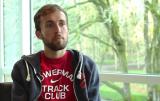
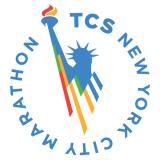
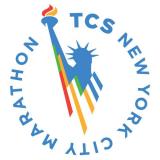
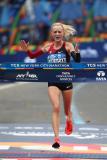










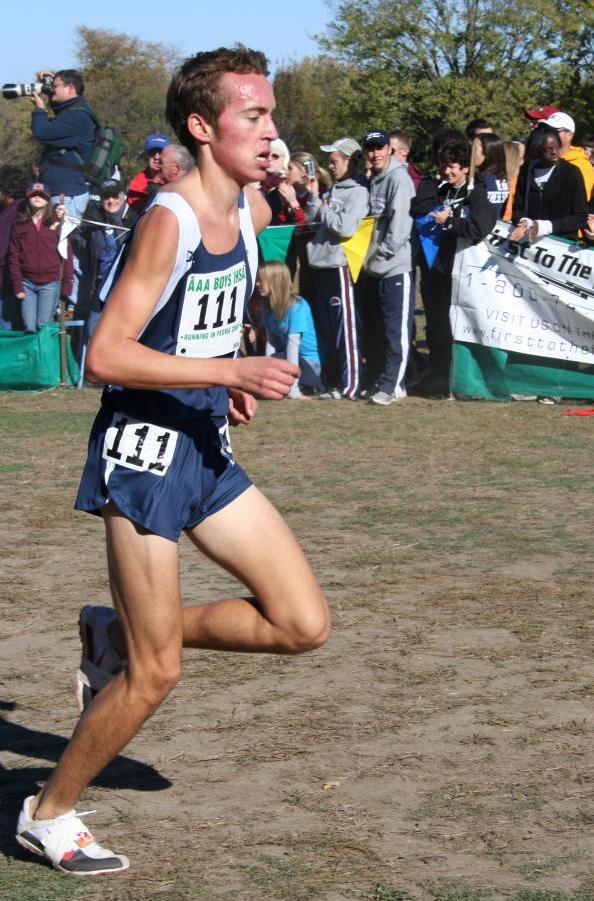 The summer before Derrick started high school, his parents nudged him in a fortuitous direction. Reading the tea leaves of their son’s athletic and physical gifts against the backdrop of a 4,000-student suburban Illinois high school, Richard and Janet Derrick, according to Chris, made the only logical decision.
The summer before Derrick started high school, his parents nudged him in a fortuitous direction. Reading the tea leaves of their son’s athletic and physical gifts against the backdrop of a 4,000-student suburban Illinois high school, Richard and Janet Derrick, according to Chris, made the only logical decision.